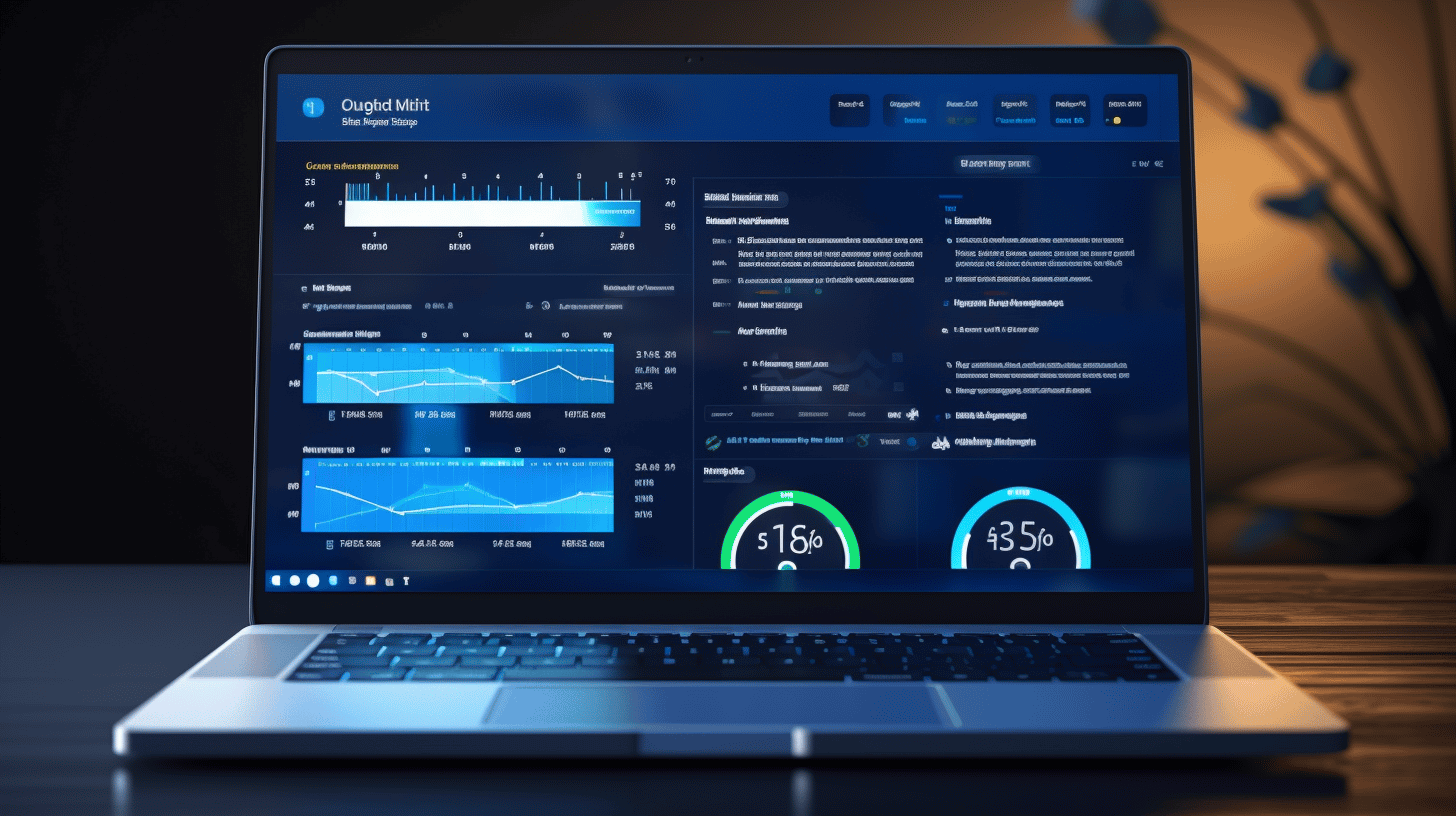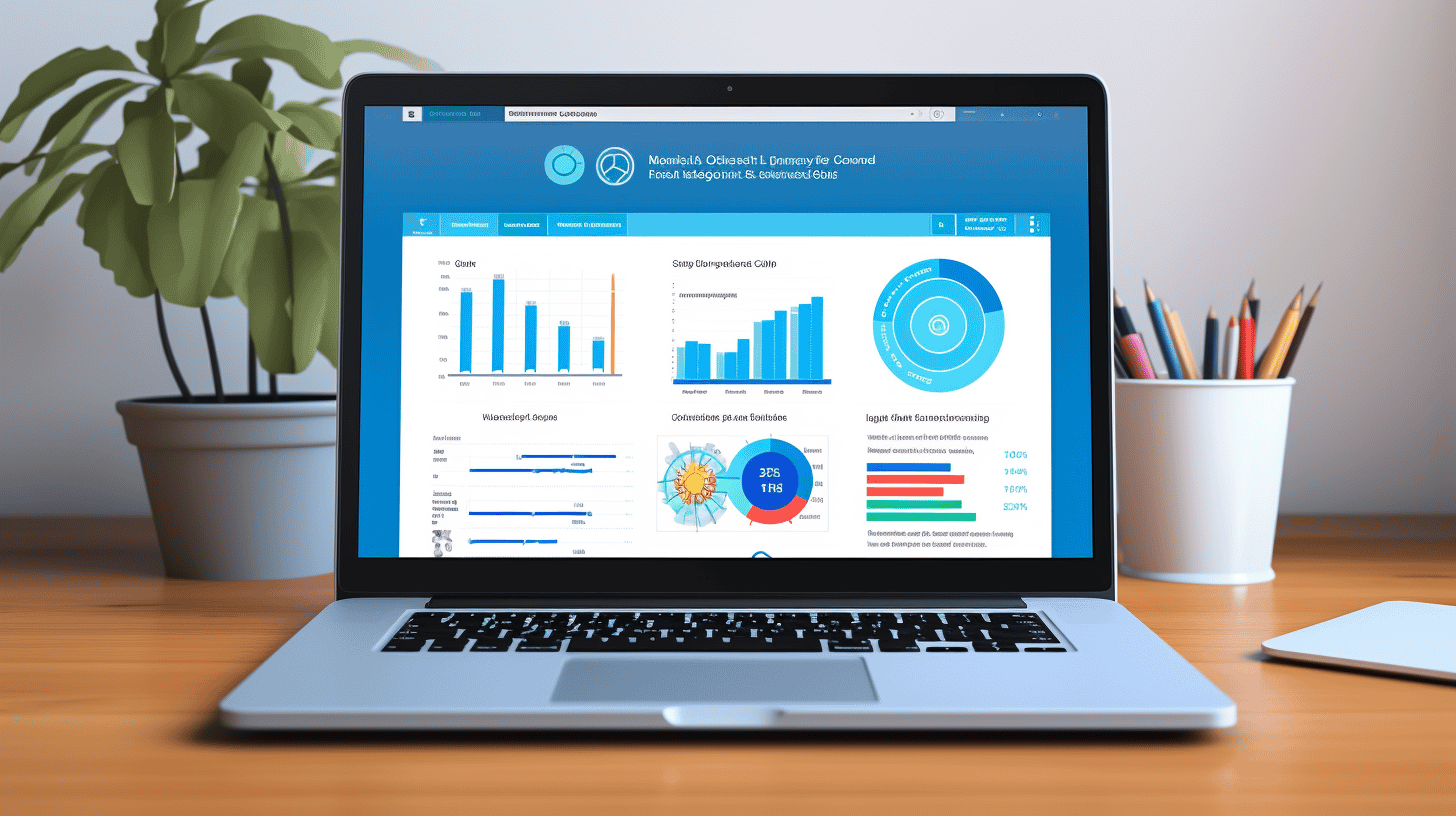在当今快节奏的数字世界中,拥有一个高性能的网站比以往任何时候都更加重要。加载时间缓慢、交互延迟和整体性能不佳可能会导致访问者感到沮丧并失去机会。如果您是希望优化网站性能的 WordPress 用户,那么您来对地方了。在本文中,我们将深入探讨网站性能优化的世界,并分享专门为 WordPress 用户量身定制的宝贵技巧。通过实施这些优化策略,您可以确保您的 WordPress 网站为访问者提供无缝且卓越的体验。
说到网站性能,速度是关键。事实上,研究表明,如果网站加载时间超过三秒,多达 40% 的访问者会放弃该网站。这意味着,即使网站速度略有提高,也会对访问者满意度和整体参与度产生重大影响。
但网站性能不仅仅关乎速度。它还关乎提供流畅、无缝的用户体验、降低跳出率和提高转化率。快速加载的网站不仅可以吸引访客,还可以提高搜索引擎排名,从而提高知名度和自然流量。
那么,如何优化您的 WordPress 网站,使其速度快如闪电、效率高呢?在以下部分中,我们将探讨各种优化技巧、影响网站性能的关键因素以及用于衡量和分析 WordPress 网站性能的工具。无论您是经验丰富的 WordPress 用户还是刚刚入门,这些技巧都将帮助您最大限度地提高网站的性能并提升您的在线形象。让我们深入研究并揭开 WordPress 优化的秘密吧!
关键要点:
- 网站性能对于用户满意度和搜索引擎排名至关重要。
- 加载时间缓慢会导致访问者感到沮丧并错失机会。
- 优化良好的 WordPress 网站可提供无缝的用户体验并提高转化率。
- 优化策略可以帮助提高网站速度、用户参与度和自然流量。
了解网站性能
您是否曾因网站加载缓慢或网页加载时间过长而感到沮丧?这是一种常见的体验,而且可能令人沮丧不已。但您是否曾停下来思考过为什么会发生这种情况?答案在于网站性能。
网站性能的重要性
网站性能是指网站加载和响应用户交互的速度。但这不仅仅与速度有关。网站性能至关重要,原因如下:
- 用户体验: 如果网站加载速度快、响应迅速,用户就会获得良好的体验。他们可以轻松浏览网站,找到所需内容,不会出现延迟或故障。另一方面,加载速度慢的网站可能会导致跳出率高,用户可能会感到沮丧,并可能离开网站,再也不会回来。
- 搜索引擎排名: 像 Google 这样的搜索引擎在确定搜索排名时会考虑网站性能。加载速度快且提供出色用户体验的网站更有可能在搜索结果中排名靠前。另一方面,加载速度慢的网站可能会受到惩罚并排名较低,从而导致知名度降低和自然访客减少。
- 转换率: 网站性能直接影响转化率。研究表明,即使页面加载时间延迟一秒钟也会导致转化率大幅下降。如果您的网站加载时间过长,用户更有可能放弃购物车或离开而不完成购买。相比之下,快速加载的网站可以提高转化率并增加收入。
影响网站性能的因素
有多种因素会影响网站性能。了解这些因素可以帮助您识别和解决可能导致网站速度变慢的任何问题。影响网站性能的一些关键因素包括:
- 服务器响应时间: 网络服务器响应用户请求所需的时间对网站性能至关重要。服务器响应时间缓慢会严重影响网站的加载速度。
- 页面大小和内容: 网页的大小及其所包含的内容会影响网站的加载速度。如果优化不当,图片、视频和过多的脚本会增加页面大小并减慢加载时间。
- 缓存: 缓存是指将某些网站元素(如图片或 CSS 文件)存储在用户设备上的过程。这样,浏览器无需再次请求这些元素,因此后续页面访问的加载速度会更快。
- 网站代码和脚本: 代码优化不佳和脚本过多会影响网站性能。不必要的代码和脚本会增加页面大小并减慢加载时间。定期进行代码优化有助于提高性能。
总之,网站性能对于提供积极的用户体验、提高搜索引擎排名和提高转化率至关重要。服务器响应时间、页面大小和内容、缓存以及网站代码和脚本等因素都会影响网站性能。通过了解和解决这些因素,您可以确保您的网站快速加载并提供出色的用户体验。
基本 WordPress 优化技巧
选择优质托管服务提供商
在优化 WordPress 网站时,您首先要考虑的事情之一就是选择可靠且优质的托管服务提供商。您选择的托管服务提供商可能会对您网站的性能和速度产生重大影响。在做出决定时,请牢记以下几个关键因素:
- 服务器正常运行时间:寻找能够保证高服务器正常运行时间百分比的托管服务提供商,理想情况下为 99.9% 或更高。这可确保您的网站可供访问者使用,从而最大限度地减少停机时间和潜在的流量损失。
- 页面加载速度:选择优先考虑快速加载时间的托管服务提供商。网站速度慢不仅会影响用户体验,还会对您的搜索引擎排名产生负面影响。在做出选择之前,请研究并比较不同托管服务提供商的加载速度。
- 可扩展性:考虑网站未来的发展,确保您选择的托管服务提供商提供可扩展性选项。随着网站流量的增加,您需要能够轻松升级托管计划以满足更高的需求。
内容分发网络 (CDN) 的使用
内容分发网络 (CDN) 可以通过将内容分发到位于不同地理位置的多台服务器上来大幅提高网站性能。此过程可最大程度缩短信息传输距离,从而缩短网站访问者的加载时间。以下是使用 CDN 的好处:
- 提高加载速度:通过缓存网站内容并通过距离访问者较近的服务器进行传输,CDN 可显著减少延迟。这可使网站速度更快、响应更灵敏。
- 全球影响力:CDN 的服务器遍布全球各地。这确保您的网站内容可以快速传送给任何位置的访问者。
- 冗余和可靠性:CDN 将您的内容分发到多个服务器,从而降低停机风险并提高整体可靠性。如果一台服务器发生故障,CDN 可以自动将访问者路由到另一台正常运行的服务器。
- 安全:CDN 通常提供额外的安全功能,例如 SSL 证书和 DDoS 保护,保护您的网站免受潜在威胁。
要为您的 WordPress 网站实施 CDN,您可以从以下热门提供商中进行选择: Cloudflare 或者 最大CDN。这些 CDN 可与 WordPress 轻松集成,并具有用户友好的界面来管理您网站的性能。
图像和媒体优化
图片和媒体文件在增强网站的视觉吸引力方面起着至关重要的作用,但如果优化不当,它们也可能是导致页面加载时间变慢的重要因素。以下是一些值得考虑的优化技术:
- 图像压缩:使用图像压缩插件或在线工具,在不影响图像质量的情况下减小图像文件大小。压缩后的图像加载速度更快,从而提高页面速度。
- 延迟加载:对图片和其他媒体文件实施延迟加载,以便仅在用户滚动到页面的相应部分时才加载。此技术有助于优先加载首屏内容,从而缩短初始页面加载时间。
- 正确的图像格式:为每种类型的图像选择适当的图像格式。例如,对照片使用 JPEG,对颜色或透明度有限的图像使用 PNG。这也有助于减小文件大小并优化加载时间。
请记住,优化您网站的图片和媒体不仅可以改善用户体验,还可以提高搜索引擎排名,因为页面速度是 Google 等搜索引擎的排名因素。
缓存以获得更好的性能
缓存是优化 WordPress 网站性能的最有效方法之一。通过存储网站页面的静态版本,缓存可以减少服务器负载并加快用户的页面渲染速度。缓存的作用如下:
- 改善页面加载时间:当用户访问您网站上的缓存页面时,服务器可以快速提供页面的静态版本,而不是动态生成。这样可以缩短加载时间并提供更好的用户体验。
- 减少服务器负载:缓存通过提供静态版本的页面来减轻服务器的负担,减少服务器的负载并允许其处理更多同时发生的请求。这对于流量大的网站尤其有益。
- 更好的可扩展性:缓存可帮助您的网站更有效地处理流量高峰。通过提供缓存页面,您的服务器可以处理更多请求,而不会遇到性能瓶颈。
要在 WordPress 网站上实现缓存,你可以使用流行的缓存插件,例如 WP超级缓存 或者 W3 总缓存。这些插件配置简单,可以显著提高您网站的性能。
请记住定期更新您的 WordPress 版本、主题和插件,并优化您网站的数据库以获得最佳性能。通过遵循这些基本的优化技巧,您可以确保您的 WordPress 网站为访问者提供快速、流畅和愉快的体验。
衡量 WordPress 网站性能
拥有一个快速且响应迅速的 WordPress 网站对于获得良好的用户体验和更好的搜索引擎排名至关重要。但是,您如何知道您的网站是否表现最佳?幸运的是,有几种工具和技术可用于衡量您的 WordPress 网站的性能。在本文中,我们将探讨一些基本工具和方法,以帮助您评估和提高 WordPress 网站的性能。
🚀 网站速度测试工具
衡量 WordPress 网站性能的最简单方法之一是使用网站速度测试工具。这些工具会分析影响网站加载速度的各种因素,例如服务器响应时间、页面大小以及加载内容所需的请求数量。一些流行的网站速度测试工具包括:
- Google PageSpeed Insights:此工具可全面分析您的网站在桌面和移动设备上的性能。它为您提供了有关可以改进和优化网站速度的领域的详细见解。
- Pingdom 网站速度测试:Pingdom 可让您从全球多个位置测试网站速度。它提供性能等级并提供有关如何提高网站速度的建议。
- GT矩阵:GTmetrix 会分析您的网站速度和性能,提供需要改进的领域的见解。它提供带有建议的详细报告,甚至将您的网站性能与行业内其他网站的性能进行比较。
⏱️ 评估服务器响应时间
服务器响应时间是影响网站整体加载速度的关键因素。这是服务器响应用户对网页的请求所需的时间。服务器响应时间缓慢会导致用户体验不佳并对网站性能产生负面影响。要评估服务器响应时间,您可以使用以下工具:
- 网页测试:WebPageTest 可让您从不同位置测试网站的性能,并提供有价值的指标,包括服务器响应时间。它还提供详细的瀑布图,显示网页上每个元素的加载时间。
- Sucuri 加载时间测试器:Sucuri 的加载时间测试器不仅可以测量您的服务器响应时间,还可以评估您网站的整体性能和安全性。它提供分数和建议,以提高您网站的加载速度。
📊 分析页面加载细节
分析 WordPress 网站的页面加载详细信息可以让您深入了解影响网站性能的特定元素。这包括识别大文件、加载缓慢的脚本或过多的重定向。以下是一些可用于分析页面加载详细信息的工具:
- Chrome 开发者工具:Chrome DevTools 是 Google Chrome 浏览器内置的一款强大工具。它允许您分析网络活动、检查元素并监控网站的加载性能。您可以识别瓶颈并优化网站以缩短加载时间。
- 慢速:YSlow 是一款浏览器扩展程序,可分析网页并提供有关如何改善其性能的建议。它提供了对页面加载时间有影响的不同组件的详细分类,例如 JavaScript、图像和 CSS。
通过使用这些工具和技术,您可以全面了解 WordPress 网站的性能,并采取必要的步骤对其进行优化。请记住,快速且响应迅速的网站不仅可以改善用户体验,而且在搜索引擎排名中也起着至关重要的作用。因此,不要忽视 WordPress 网站的性能方面,立即开始衡量和改进其性能。
解决 WordPress 性能问题
您的 WordPress 网站运行缓慢吗?别担心,您并不孤单。许多网站所有者在某个时候都会遇到 WordPress 网站的性能问题。加载时间缓慢会让访问者感到沮丧,并对您的网站在搜索引擎上的排名产生负面影响。但不要害怕!在本文中,我们将讨论一些常见的性能问题原因,并为您提供故障排除步骤,以使您的网站加快速度。
识别插件问题
🕵️♀️ 找到罪魁祸首:插件是扩展 WordPress 网站功能的绝佳方式。但是,编码不当或资源密集型的插件可能会严重影响性能。识别有问题的插件是解决性能问题的关键第一步。
您可以执行以下操作:
- 📋 首先停用所有插件,然后观察网站的性能是否有所改善。如果确实如此,则可以断定是某个(或多个)插件导致了网站速度变慢。
- 📝 逐个重新激活插件,在激活每个插件后测试网站的性能。如果在激活某个插件后性能急剧下降,则说明您已经找到了罪魁祸首。
- ❌ 考虑替代方案:如果您发现某个插件会严重影响性能,请寻找提供类似功能但性能更好的替代插件。此外,请确保所有插件都更新到最新版本。
解决主题相关问题
🎨 WordPress 主题对网站性能影响巨大。优化不佳的主题可能会降低网站速度并产生问题。
您可以执行以下操作:
- 💼 选择轻量级主题:选择针对性能进行了优化且不附带不必要功能的主题。考虑使用可信赖的主题框架,例如 创世纪 因其速度和可靠性而闻名。
- ⚙️ 优化主题代码:如果您熟悉编码,请检查主题代码以找出任何低效之处。删除任何可能影响性能的不必要或臃肿的代码。如果您不熟悉编码,请考虑聘请开发人员来协助您。
解决与托管相关的问题
🌐 您选择的网络托管环境会极大地影响您网站的性能。尤其是共享托管计划,由于多个网站共享有限的资源,可能会导致速度变慢。
您可以执行以下操作:
- 🚀 选择信誉良好的托管服务提供商:选择提供优化 WordPress 托管服务的可靠托管服务提供商。寻找提供快速服务器、拥有良好客户支持并提供缓存等选项以提高性能的提供商。
- 💡 升级您的托管计划:如果您目前使用的是共享托管计划,并且遇到持续的性能问题,请考虑升级到专用或 VPS 托管计划。这些计划提供更多资源,并能更好地控制您的网站性能。
应对高流量
🚦随着您的网站吸引越来越多的流量,确保您的服务器能够处理负载至关重要。高流量可能会导致您的网站速度变慢甚至崩溃。
您可以执行以下操作:
- 📈 使用缓存插件:实现一个缓存插件,例如 W3 总缓存 它可以通过存储网页的静态版本并将其提供给访问者来加快您的网站速度,从而减少服务器的负载。
- 🔄 优化图片:大型图片文件会严重降低网站速度。使用以下图片优化插件 斯马什 在不影响质量的情况下压缩和调整图像大小。
现在您已经有了解决常见 WordPress 性能问题的路线图,请将这些步骤付诸实践,并观察您的网站速度是否得到改善。请记住,性能优化是一个持续的过程,因此请养成定期监控和维护网站速度的习惯,以获得最佳的用户体验。
结论
总而言之,优化 WordPress 网站的性能对于提供流畅、无缝的用户体验至关重要。通过实施我们讨论的基本优化技巧,您可以显著提高网站的速度和效率。请记住选择 Managed-WP™ 等可靠的托管服务提供商,以确保您的网站由高性能基础设施支持。此外,利用 CDN、优化图像和媒体、使用缓存技术、最大限度地减少外部脚本和 HTTP 请求,并定期更新 WordPress 版本、主题和插件。不要忘记优化数据库,以保持网站以最佳状态运行。通过遵循这些技巧并解决出现的任何性能问题,您可以最大限度地提高 WordPress 网站的性能,并为访问者提供一流的体验。
最大化您的网站性能 托管-WP™ 领先的托管 WordPress 托管平台。享受简化的基础设施、自由的数字体验以及我们 24/7/365 全天候支持带来的专家级问题解决方案。
常见问题
- 有哪些优化技巧可以最大限度地提高 WordPress 网站的性能?
一些可最大限度提高 WordPress 网站性能的优化技巧包括:1. 使用缓存插件,2. 优化图像和媒体文件,3. 缩小 CSS 和 JS 文件,4. 启用 GZIP 压缩,5. 使用内容分发网络 (CDN)。
- 缓存插件如何帮助优化网站性能?
缓存插件会创建并存储网页的静态 HTML 副本,从而减少服务器处理时间并更快地向访问者提供内容。这可以缩短页面加载时间并提高网站的整体性能。
- 为什么图像优化对网站性能很重要?
图片优化可以在不影响质量的情况下减小图片文件大小,从而加快网页加载速度。通过压缩图片、调整为合适尺寸以及使用现代图片格式,您可以显著提高网站性能。
- 什么是 GZIP 压缩以及它如何优化网站性能?
GZIP 压缩是一种在将文件发送到浏览器之前对其进行压缩的方法。它可以减小 CSS 和 JS 文件等资源的文件大小,并加快向访问者传送的速度,从而提高网站性能。
- 使用内容分发网络 (CDN) 进行网站优化有哪些好处?
内容分发网络 (CDN) 将您网站的静态文件副本存储在位于不同地理位置的服务器上。当用户访问您的网站时,CDN 会从最近的服务器提供文件,从而减少延迟并提高网站加载速度。



















